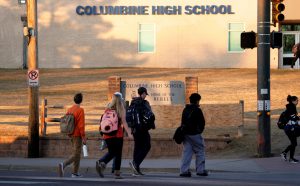
By Steve Holland and Jeff Mason
WASHINGTON (Reuters) – U.S. President Donald Trump urged lawmakers on Tuesday to work toward bipartisan compromises, but pushed a hard line on immigration, insisting on a border wall and other concessions from Democrats as part of any deal to protect the children of illegal immigrants.
Trump, in his first State of the Union speech, gave no ground on the contentious issue of whether to shield young immigrants known as “Dreamers” from deportation.
Aiming to keep conservative supporters happy as he looks to November congressional elections, Trump stood by a set of principles opposed by Democrats, including the border wall with Mexico and new restrictions on how many family members that legal immigrants can bring into the United States.
“Tonight, I call upon all of us to set aside our differences, to seek out common ground, and to summon the unity we need to deliver for the people we were elected to serve,” Trump said in his address.
Trump used the hour-and-20-minute speech, given annually by presidents to Congress, to try to overcome doubts about his presidency at a time when he is battling a probe into his campaign’s alleged ties with Russia and suffering low job approval ratings.
Trump made no mention of the federal probe into whether his campaign colluded with Russia in the 2016 presidential election, a controversy that is dogging his presidency. Trump has denied collusion and has called the probe a “witch hunt.”
The speech was short on details about Trump’s policy proposals.
But his sober, measured approach was welcomed by the public. A CNN/SSRS snap poll said 48 percent of those surveyed had a “very positive” response to the speech and 22 percent “somewhat positive.”
There was little sign of unity inside the House of Representatives chamber where Trump spoke. Republican lawmakers cheered wildly at the president’s applause lines. Democrats often sat in their seats silently and many booed when he laid out his immigration proposals.
DENOUNCES NORTH KOREAN LEADERSHIP
Turning to foreign policy late in the speech, Trump denounced the “depraved character” of North Korea’s leadership and said Pyongyang’s “reckless pursuit of nuclear missiles could very soon threaten our homeland.”
“We are waging a campaign of maximum pressure to prevent that from happening,” he said. In a surprise moment, he singled out a North Korea defector in the crowd, Ji Seong-ho, as an example of what he called the reclusive country’s brutal nature.
Trump also said he had signed an order to keep open the U.S. military prison at Guantanamo Bay, Cuba, for foreign terrorism suspects. Former Democratic President Barack Obama had vowed to close the prison, which has been condemned by human rights groups, but was unable to shut it down completely.
Whether Trump would follow through on his appeal for bipartisan harmony was far from clear. Trump’s past attempts at a unifying message have been undermined by his later rancorous tweets and divisive statements that angered Democrats and frequently annoyed lawmakers in his own Republican Party.
The unity plea will first be put to the test in his drive for a compromise on protecting 1.8 million Dreamers – people brought illegally to the country as children – who face a March 5 deadline on whether they can begin to be deported.
Republicans welcomed Trump’s immigration proposals, with U.S. Senator James Lankford of Oklahoma saying Trump tried to strike a middle ground.
“My Democratic colleagues can say he didn’t move enough, but you can’t deny he moved a lot. There are people in his core base who think he has moved way too far.”
But Senator Patrick Leahy, a Vermont Democrat and the longest-serving senator, said Trump’s words about unity, after a year of “divisive actions, petty insults and disgraceful race-baiting … ring hollow.”
Trump said he was “extending an open hand” for an immigration deal and that he would provide Dreamers a pathway to citizenship over 10 to 12 years in exchange for funding the border wall, which he promised during his campaign, and restrictions on legal immigration.
He called his plan a “down-the-middle compromise,” but some Democrats hissed when he said he wanted to rein in “chain migration,” the ability of legal immigrants to bring a wide-ranging number of family members into the country.
“Let’s come together, set politics aside and finally get the job done,” Trump said.
INFRASTRUCTURE PLAN
Trump took credit for U.S. economic gains including a soaring stock market and a low jobless rate. He boasted about the economic growth he believes will result from tax cuts Republicans pushed through Congress late last year.
“This is our new American moment. There has never been a better time to start living the American Dream,” he said.
Trump said he would like a compromise over a plan to rebuild aging roads, bridges and other infrastructure. He said he wanted legislation to generate at least $1.5 trillion through a combination of federal, state and local spending as well as private-sector contributions.
Market reaction was muted, with S&P 500 futures drifting higher, but investors saying there was little new for Wall Street in the speech.
“Futures lifted a bit because it was not a negative speech. He was calm. He celebrated America. He avoided his own failures,” said Tim Ghriskey, chief investment officer at Cresset Wealth Advisors in Chicago.
While Trump spoke of compromise, his speech provided some reminders of partisan battles over the past year.
He singled out a speech guest, 12-year-old Preston Sharp, for leading an effort to put American flags on the graves of 40,000 veterans, saying the initiative was “why we proudly stand for the national anthem.”
His criticism of National Football League players who refused to stand for the anthem in protest against police shootings of minorities and racial disparities in the justice system, dominated headlines last autumn.
(Additional reporting by Richard Cowan, Susan Cornwell, Roberta Rampton, Makini Brice, Eric Beech and Eric Walsh; Editing by Peter Cooney)




